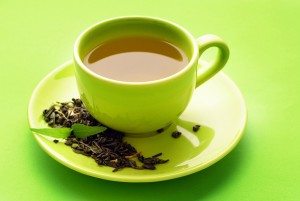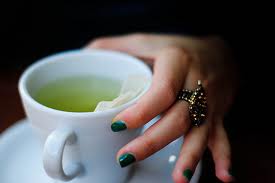Chances are you heard about the benefits of drinking green tea to reduce heart disease. But the polyphenols of green tea also prevent cancer, depression and cognitive decline.
Green tea lowers cardiovascular mortality
A study in the Chianti region of Tuscany, Italy consisted of 807 men and women aged 65 years and older. They had urine tests for metabolites of green tea in the beginning of the study. The study went on for 12 years. 274 participants died, which was 34% of the total study group. Tests measured the total urinary polyphenol (TUP) concentration in both groups, the survivors and the participants who died. Those participants whose TUP was in the highest tertile of the TUP values had the lowest all-cause mortality. And those participants whose TUP was in the lowest tertile had the highest all-cause mortality.
High blood pressure and stroke
A Taiwanese study from 2004 examined the blood pressure of 1507 subjects. There were 711 men and 796 women with a recent diagnosis of high blood pressure. The investigators looked at tea consumption (green tea and oolong tea) and blood pressure reduction. They found that those who drank 120 to 599 mL/day of green tea or oolong tea decreased their blood pressure by 46%. Those who drank more than 600 mL/day of green tea or oolong tea lowered their blood pressure by 65%.
Another meta-study involving 194,965 people and 4378 strokes found that there was a reduction of strokes with increasing tea consumption. Those who drank 3 or 4 cups of green tea or black tea per day were the experimental group. Researchers compared them to the control group that drank less than one cup of tea per day. The experimental group had a 21% lower risk of getting a stroke than the control group.
Cancer prevention more with black tea than with green tea
A meta-analysis of 18 studies from China showed that green tea and black tea consumption was beneficial for prevention of cardiovascular disease and for cancer prevention. The highest consumption of green tea reduced cardiovascular mortality by 33%. The highest black tea consumption lowered mortality by 12%. Cancer mortality turned out to be different. Green tea did not produce a reduction in mortality, but black tea lowered it by 21%.
Another study, this one from Shanghai, China, points out that there are 15 polyphenols in green tea that likely work on different target areas of the body. They target 200 different genes in humans affecting diabetes, cancer, cardiovascular disease, neurodegenerative disease, muscular disease and inflammation.
Other cancers like prostate and breast cancer benefit from green tea
This study shows evidence that habitual green tea drinkers do prevent prostate cancer and breast cancer to a certain extent.
Another study investigates the effect of tea on health. One of the studies from the same authors have shown that the oxidative damage to cells from cigarette smoking can come out in a urine test. Those smokers who drank 4 cups of tea per day had a 31% decrease in their urinary biomarkers to indicate DNA damage. As DNA damage is often the first step in cancer development, these findings are important to note.
Cognitive effects of green tea consumption in dementia patients
A 2017 review of dietary supplements to improve cognitive impairment pointed out several supplements that will improve cognition. Green tea is one of them, but omega-3 fatty acids (EPA), and docosahexaenoic acid (DHA) are also useful supplements to restore neuronal functioning.
A 2017 study from Basel, Switzerland found that green tea improved memory, reduced anxiety and activated the working memory, which could be made visible on functional MRI scans. These researchers also pointed out that green tea has this effect as a whole, you cannot attribute it to a single constituent. Separate tests of caffeine or L-Theanine showed that the beneficial effect was smaller than when green tea as a whole was tested.
2016 study on severe Alzheimer’s patients
This 2016 Iranian study looked at 30 patients with severe Alzheimer’s disease. A baseline assessment was first, and 2 months after taking 4 green tea pills daily another assessment followed. A blood test measured the oxidative stress before and after, so was the antioxidant level from the green tea. The oxidative stress test showed an improvement during the study. The antioxidant level in the blood was higher than before the start of the study. The cognitive function test improved only slightly.
A 2018 study from Singapore looked at the effect of drinking tea (black tea or green tea) regarding symptoms of anxiety or depression. In a group of 614 subjects who were elderly individuals, aged 60 years and above; 59% consumed tea for longer than 15 years. These tea-drinking people were significantly less depressed and significantly less anxious when they underwent psychological tests, compared to non-tea drinkers.
Depression and green tea consumption
There is a 2018 study from South Korea that looked at the link of beverages from 15 studies with depression. 347,691 participants were part of these 15 studies, and 20,572 cases of depression developed. Comparing a high consumption of tea or coffee to low consumption, the following statistics were the result: coffee consumption reduced depression by 27%, green tea consumption by 29%.
Conclusion
Bioflavonoids are powerful antioxidants. But there are many more substances in green tea and coffee that are all beneficial for our health. One of the studies mentioned identified 15 polyphenols in green tea. But another study said that trying to identify one of the components as more active than the others would be a waste of time. They measured some of the factors by themselves and found that the overall effect was much smaller than green tea as a whole.
Other research has shown that the components of green tea activate several genes. This includes anti-inflammatory effects, prevention of heart attacks and strokes, lowering of blood pressure, anti-cancer effects, improvements of cognitive function, as well as improvement of depression and anxiety. As you can see the effect of green tea is diversified. Don’t hesitate to consume another cup of tea!









